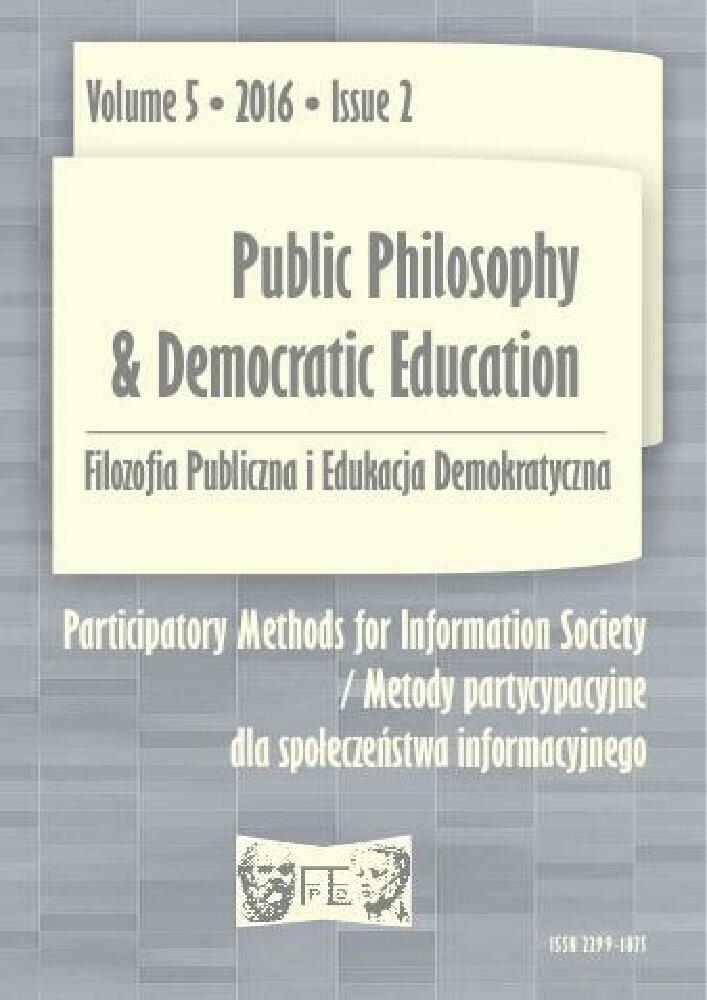Abstrakt
The European Commission highlights that creating shared values and democratic citizenship is a today’s requirement to answer challenges of urbanization in Europe. The awareness about the necessity of inclusion of vulnerable groups such as elderly or migrants is still a substantial deficit in research on inclusion. As a matter of principle, future cannot be forecasted. The most effective way to foresee future is to jointly shape it! The Participatory Citizen-Foresight offers a neutral transformation-room and multi-method coordination-framework for detecting accessible and tacit-knowledge for change. In co-creation citizens, experts and Civil-Servants gain insights into complex interdependencies allowing mutual learning and behavior in rehearsal for transition. Society is in need of powerful, collective pictures serving self-confidence and self-responsibility of citizens. First, we describe the specific, participatory-foresight approach. Second, we highlight preconditions for learning and societal change based on constructivism and brain research. Third, we show how this can work in reality by shortly outlining two Citizen-Foresight cases with elderlies and, fourth, we derive selection-criteria for methods aiming at transforming mental images, maps and behaviour.
Bibliografia
Biegelbauer, P. (2013). Wie lernt die Politik - Lernen aus Erfahrung in Politik und Verwaltung. Wiesbaden: Verlag für Sozialwissenschaften.
Boden, M., Cagnin, C., Carabias, V., Haegeman, K. and Konnola, T. (2010). Facing the future: time for the EU to meet global challenges, EUR 24364 EN. Luxembourg: Publications Office of the European Union.
Cagnin, C., Keenan, M., Johnston, R., Scapolo, F., Barré, R., (Eds.) (2008). Future-Oriented Technology Analysis –Strategic Intelligence for an Innovative Economy. Heidelberg: Springer Verlag.
Cagnin, C., Amanatidou, E., Keenan, M. (2012). Orienting European innovation systems towards grand-challenges and the roles that FTA can play. Science and Public Policy, 39(2), 140-152. doi:10.1093/scipol/scs014
Erickson, M. H. (1954). Pseudo-orientation in time as an hypnotherapeutic procedure. International Journal of Clinical and Experimental Hypnosis, 2(4), 261-283.
Freeman, C., Soete, L. (1997). The Economics of Industrial Innovation. London: Pinter.
Georghiou, L., Cassingena Harper, J., Keenan, M., Miles, I., Popper, R. (2008). The Handbook of Technology Foresight: Concepts and Practice. Northampton, MA: Edward Elgar Publishing.
Helmreich, S., Düh, J., Kubeczko, K., Wilhelmer, D. (2011). Foresight Process. In: S. Helmreich, H. Keller (Eds.), FREIGHTVISION – Sustainable European Freight Transport 2050. Forecast, Vision & Policy Recommendation. Berlin-Heidelberg: Springer Verlag.
Hüther, G. (2010). Die Macht der inneren Bilder. Wie Visionen das Gehirn, den Menschen und die Welt verändern. Göttingen: Vandenhoeck & Ruprecht Verlag.
Laegreid, P., Sarapuu, K., Rykkja, L. H., Randma-Liiv, T. (2015). New coordination challenges in the welfare state. Public-Management-Review, 17(7), 927-939.
Lindner, R. (2012). Cross-Sectoral Coordination of STI-Policies: governance principles to bridge policy-fragmentation. In: Innovation System Revisited: experiences from 40 years of Fraunhofer ISI Research (pp. 275-289). Stuttgart: Fraunhofer Verlag.
Markowitsch, H. J. (2013). A paradigm shift is needed! In: M. Eckoldt, Can the brain understand the brain? Dialogues about brain-research and the limits of perception and insights (pp. 25-28). Heidelberg: Carl-Auer Verlag.
Miles, I. (2008). Foresight Methodology. In: L. Georghiou, J. C. Harper, M. Keenan, I. Miles., R. Popper (Eds.), The Handbook of Technology Foresight: Concepts and Practice. Northampton, MA: Edward Elgar Publishing.
Nowotny, H., Scott, P., Gibbons, M. (2003). “Mode 2” revisited: The new production of knowledge. Minerva, 41(3), 179-194.
Peters, B. G. (1998). Managing Horizontal Government: The Politics of Co-Ordination. Public administration, 76(2), 295-311.
Popper, R. (2008). How are foresight methods selected? Foresight,10(6), 62-89.
Rittel, H., Weber, M. (1973). Dilemmas in a general theory of planning. Policy Sciences, 4(2), 155-69.
Schein, E. H. (2010). Organizational-Culture and Leadership. San Francisco: Jossey-Bass.
Schmidt, G. (2004). Love affairs betwixt problems and solutions. Hypnosystemic work in difficult contexts. Heidelberg: Carl-Auer Verlag.
Senge, P. M. et al. (2011). The necessary revolution. How people and organizations cooperate aiming at co-creation of a sustainable world. Heidelberg: Carl-Auer Verlag.
Verhoest, K., G. Bouckaert, et al. (2007). Janus-faced reorganization: Specialization and coordination in four OECD countries in the period 1980-2005. International Review of Administrative Sciences, 73(3), 325-348.
Wilhelmer, D. (2009). Reminiscence of a better future. Syntax for a complementary innovation counselling. Heidelberg: Carl-Auer Verlag.
Wilhelmer, D., Nagel, R. (2013). FORESIGHT. Ein Managementhandbuch für das Gestalten von Open Innovation. Heidelberg:Carl-Auer Verlag.
Wilhelmer, D. (2013). Zukunft entsteht in Co-Kreation. Change X, 12.12.2013.
Willke, H. (1998). Systemisches Wissensmanagement. Stuttgart: Lucius & Lucius.
Willke, H. (2004): Einführung in das systemische Wissensmanagement. Heidelberg: Carl-Auer Verlag.
Licencja
Prawa autorskie (c) Autorzy zachowują prawa autorskie i prawa do publikacji swoich artykułów w tym czasopiśmie, przyznając czasopismu prawo do ich rozpowszechniania na warunkach CC BY-NC-ND 4.0
